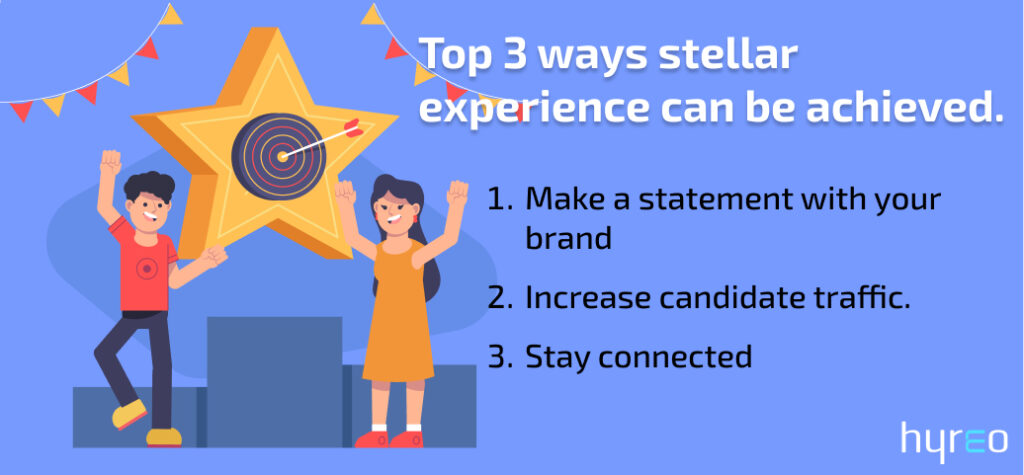If one thing’s for certain in 2022, the way we recruit has changed or maybe has been ‘completely revolutionized’. Companies and recruiters are now committing to creating a candidate centric experience when hiring. Because the consequences of a negative interaction can be far reaching.
A staggering 63% of job seekers are likely reject a job offer because of a poor candidate experience. And it doesn’t stop there, 72% of candidates share a negative social media review about the company, whilst a further 64% state they would be less likely to purchase that company’s product or services.
There’s been a dynamic shift in the HR world and the power has transferred from employer to employee within the recruiting process. With candidates becoming fussier as to where they want to work, recruiters are having a hard time to close positions.


That’s why nailing your candidate experience is critical!
Candidate experience refers to the interactions a job applicant has with a company, Talent Acquisitor or recruitment agency during the hiring process. This includes every action or communication from the moment an individual reads the job description, submits an application, goes for an interview, to the job offer, salary negotiation and finally being onboarded.
All of the interactions during the recruitment process impact the candidate experience. Get off to a bad start and your potential future employee’s opinion of your organization is clouded. Even if the rest of their experience is stellar, they always remember that bad beginning. Great candidate experience is the core of successful recruiting and hiring.
These days Recruiters have taken a step ahead to provide more value-added services, to the candidate to create a memorable and great experience. Talent Acquisitors are training and preparing the candidates for interview, inducting them to the organization they are hired for and introducing them to company culture and expectations. Constant communication with some personal touch from the recruiter’s end is creating a sense of trust amongst candidates. Also, recruiters are open to feedback from candidates, to better their experience at all levels to create a stellar journey for the candidates.
Poorly developed recruiting strategies are the root cause of many problems with lacklustre employee engagement and eventual turnover. For example, having the direct hiring manager involved in the process with the candidate is critical to building a relationship and trust with the company versus, the candidate only getting to interact with the recruiter and human resources ahead of their start date. And rejected candidates who had a poor experience are likely to tell others, reflecting negatively on your brand.
By understanding the importance of the job seeker’s journey and designing the recruiting process so that they’re treated with the same respect as a customer, brands are finding great success. When working on improving candidate experience and enriching a candidate’s job search process, recruiters should look at these points:
- Corporate career web page and job descriptions
- Recruitment marketing and social media outreach
- The online job application process
- Communications from a recruiter, recruiting coordinator, talent acquisitor, interview team, or hiring manager
- The interview process
- Follow-up communication once interviews are completed
- Rejection or job offer communication
- Offer negotiation and acceptance
- New hire onboarding
- Introducing them to company culture.
According to a LinkedIn study, 75% of candidates look at an employer’s brand before even applying for a job, and 52% research the company’s website and their social media first to learn more about them. Typically, they’re looking for information about the company’s culture, history, and achievements.
But the pandemic, along with the unrest of the last few years, has added a new layer to what candidates find important: organization’s stance on social issues, current events, and diversity, equality, and inclusion. Many candidates want to know that the brand is honest and transparent and will speak up and take a stance on issues that matter to them.
Some may also be searching for information on the company’s offers in terms of its services and products, and whether they’ve changed or improved over time. Thus, it is very important for all parties involved in the recruitment process to create unforgettable and great experience. Let’s look at a few steps how this stellar experience can be achieved.
- Make a statement with your brand. It’s not enough to be as good as everyone else. Job seekers have options and in order to acquire the best talent your brand must stand out. Content-rich career sites allows the company to attract both active and passive candidates.
Branded templates, campaigns, and portals let you personalize your outreach, providing a memorable first impression. And configurable workflows let you manage your entire brand portfolio with ease. - Provide engaging career websites.
Does your career page effectively represent your company? Is it reflective of your brand? Using career site tools helps to build dynamic and flexible career site pages. Configurable job widgets let you promote and display job opportunities will little effort. And by deploying mobile-ready sites candidates can apply from anywhere. - Increase candidate traffic. More applicants give you more flexibility in hiring. And as every applicant is a potential employee, future customer, or brand ambassador, having a larger pool is a win. Streamline the application process using integrated automation technologies and CRM software. A one-click mobile and social application process drives greater numbers of qualified candidates.
- Stay connected. We’ve all felt the angst from being left in the dark and it doesn’t do anything to elevate the candidate experience. Rather than a brand ambassador, it gives you a tarnished brand. Keep candidates engaged and informed throughout the hiring journey.
It allows you to provide automatic status updates to candidates and alerts job candidates of hiring events, career fairs, and future opportunities. And “live” profiles let you stay up-to-date on a candidate’s job search while also staying compliant. - Go the extra mile. Showcasing amazing video content that offers candidates an insider’s view into the company culture, values, mission, and overall work-life allows the candidate to get a true sense of what the future may hold for them with your company.
Hiring for cultural fit is essential to keeping your company’s reputation in good standing. Bad cultural fits tend to be disengaged from work. Weeding out people who don’t fit your culture during the recruitment process can save you money in the long run. Culture fit is the glue that holds an organization together, which is a key trait to look for when recruiting.
The result of poor culture fit due to turnover can cost an organization between 50-60% of the person’s annual salary, according to the Society for Human Resource Management (SHRM). If you assess culture fit throughout the recruiting process, you will hire professionals who will flourish in their new roles, drive long-term growth and success for your organization, and ultimately saving time and money.
Without the right tools at hand, it can be challenging to implement a new way of working and culture, especially when it comes to recruitment and candidate experience. With the growing importance of data and analytics to facilitate business processes and ensure higher rates of insight and improvement, you require something that can learn your recruitment process, chart your candidate’s journey and take care of several recruiting tasks. Therefore, the possession of a tailored recruitment management system can help to serve your recruitment process better and enable a positive candidate experience.
Automate the Process. This increases its speed, with less reliance on manual application processes. The candidate’s information is easily formatted and presented to the recruiter which further helps in sharing information far quicker with the candidate. The use of a tool allows the recruiter or team to focus on the human elements of recruitment, such as building a good relationship with candidates and selecting the right person for the role. It also helps in collecting data which is crucial to the recruiter.
Data in Recruitment
There’s a lot of talk about the importance of data in recruiting these days, and for good reason, too! As recruiting teams evolve their understanding of the recruiting funnel and implement metrics-driven approaches similar to that of sales and marketing teams, taking a closer look at how we use and report on data is a natural and necessary outcome.
Ultimately, the hiring managers are leaders with a lot on their plates, and the hard truth is that they have to prioritize a lot of other daily responsibilities over recruiting. The job as recruiters is to be proactive partners and to keep our hiring managers up-to-date by providing data on their job search that’s synthesized and helpful. And one of the main ways we can do that is through reports.
A data driven approach is beneficial for the recruiter to find the right candidates. Recruiters can utilize data to improve the efficiency and effectiveness of the process. The creation of surveys and use of Net Promoter Score (NPS) to judge the company’s performance, which helps the recruiter to learn better on how to create a better candidate experience.
The use of technology will benefit everyone. It speeds up the recruitment process and focusses on creating better experiences for your candidates. It can bring synergy to your operation, and plays a massive role in building a culture of excellent candidate experience.
From the time a job candidate first hears of your organization, to when they’re going through the hiring process, and even long after they’ve been hired, they’re forming perceptions. Are they good perceptions, or bad? A great candidate experience software can make or break your business.
Companies that provide prospective employees with a good experience are more likely to not only attract, but retain top talent. Those that are less attuned to a candidate’s needs are likely to garner a reputation and not a good one. The next time they try to score that great hire, they may even strike out. Organizations like Hyreo offers talent acquisition teams the best candidate experience software.
This candidate experience solution utilizes a modern and localized candidate experience to elevate the recruiter, and foster deeper connections with job seekers.
Analytics can play a valuable role in improving the candidate experience for both job candidates and recruiters alike. Typically, a recruiting team is working off of data contained within the Applicant Tracking System (ATS). These technologies are used for tasks like taking in applications, collecting referrals, and tracking a candidate’s progress through the pipeline.
While newer ATS technologies tend to offer some kind of analytics module, these insights are little more than vanity metrics that look at one data point at a time, such as number of applications received or where people sit in the pipeline.
Furthermore, the recruiter’s ATS is only looking at data contained within its silo, which eliminates the ability to make valuable connections to pre-application and post-hire data which is contained in your HRIS, Finance, website, CRM, and other systems.
Without the ability to do this kind of multi-dimensional analysis, the relationships between all your workforce data, pre- and post-hire can’t be easily explored, preventing the recruiter from getting accurate strategic insights that can vastly improve both the candidate experience and the overall recruiting process and the recruiter.
There’s no denying the importance of data in recruiting! It’s immense value to tracking KPIs to measure the effectiveness of your recruiting process.



